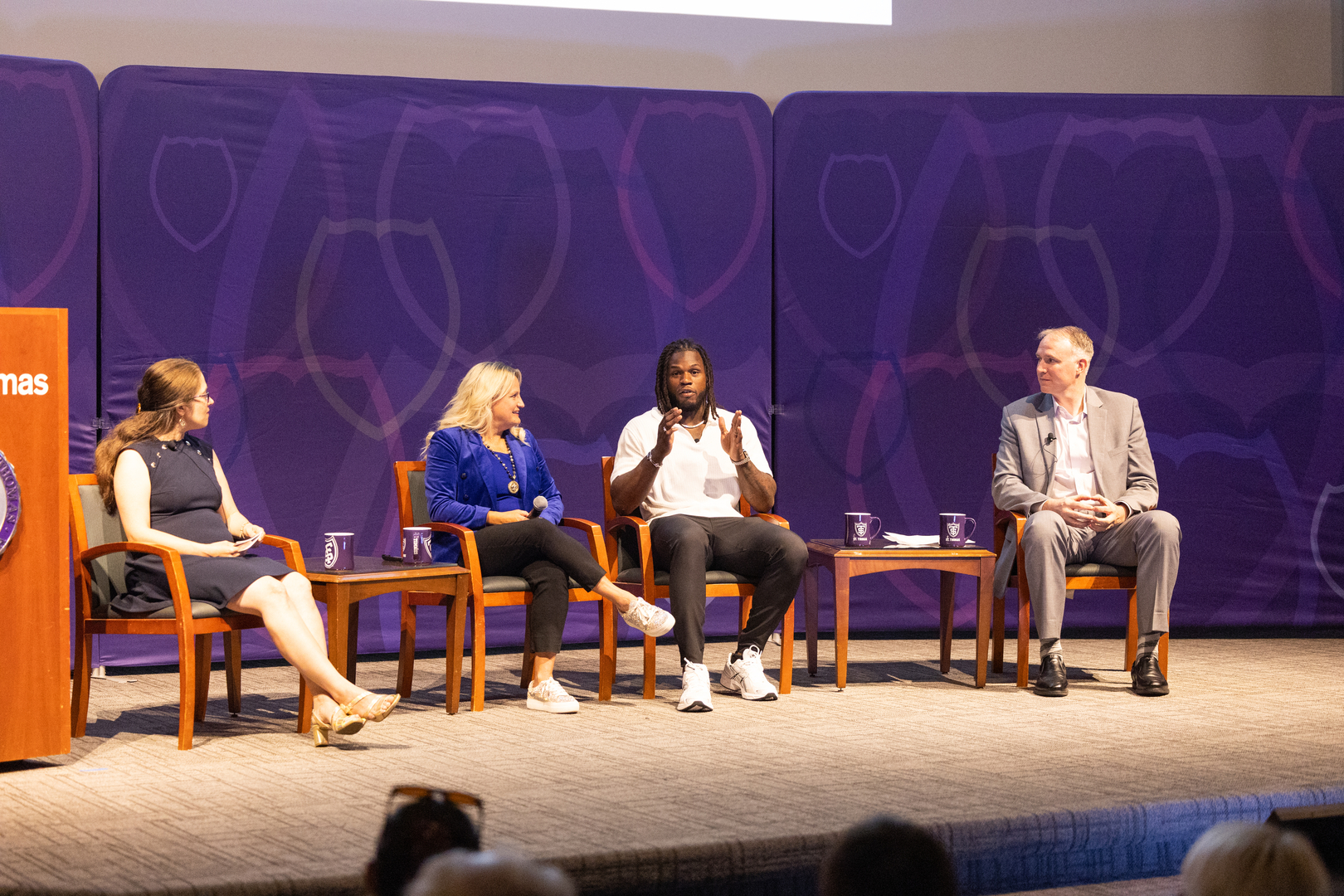Sports
Learning Grit: Applying Resilience Lessons From Sports in Everyday Life – Newsroom | University of St. Thomas

Performance Coach Cindra Kamphoff, PhD, Spoke at the University of St. Thomas Finding Forward Event About Building Mental Toughness in an Uncertain World
What is grit? How does it help people? And why is it an intergenerational flashpoint? A recent event at the University of St. Thomas gathered Minnesota Vikings defensive player Josh Metellus; Tommie men’s basketball head coach Johnny Tauer, PhD; and performance coach, author and speaker Cindra Kamphoff, PhD, to talk about grit, resilience, toughness, and how they are perceived today.
When the University of St. Thomas jumped from Division III to Division I athletics, its teams found themselves facing challenges they never had before. For Tauer, a professor of psychology as well as the Tommies’ coach, it was an objective lesson in the importance of grit.
“We started the same five guys who, six months earlier, were playing Division III teams and winning, and suddenly they are looking across the circle and thinking, we could be in trouble,” he said. “We won 10 games that year, but we also lost 12 in a row. They totally embraced the process. They were really fearless. If we can come through that in the first year, what could we accomplish going forward?”
Yet despite such demonstrations of resilience, University of St. Thomas President Rob Vischer hears complaints that grit is generally lacking today. “Whether it relates to helicopter or snowplow parenting, or the amount of unsupervised playtime outside … this perception that our levels of grit and resilience and mental toughness are declining is less about finding a path forward, and it’s more about a declaration of generational failure,” he noted.
Instead of judging others, Vischer proposed finding common ground about grit – that it is a helpful quality that can be taught and practiced – and it can help move the conversation forward. That was why it was the topic of a recent Finding Forward session at the University of St. Thomas, a speaker series seeking ways to move beyond entrenched positions on polarizing topics.
Making the most of grit and resilience
The first thing to understand, Kamphoff said, is how grit, resilience and toughness work together.
“Mental toughness gets a bad rep, right? We kind of think (it means) we need to keep pushing ourselves until we’re ready to fall apart,” Kamphoff said. “That’s not what mental toughness is. Mental toughness and mental strength is really about caring for yourself along your journey.”
Resilience, Kamphoff said, is how you respond to adversity, the ability to bounce back and try again. Together, these help form the quality called grit. Kamphoff shared a definition from author Angela Dusckworth, who popularized the term: “Having passion for what you do, persevering despite difficulties and setbacks, and knowing why you are pursuing your goals.”
Grit doesn’t always mean achieving goals. For Metellus, grit is about finding a focus for his passion. “You don’t accomplish everything you set out to do. I couldn’t fall in love with (my) actual accomplishments because I didn’t get there yet,” he said. “I had to fall in love with something, and that was the process. I always tell the younger guys to trust the process, fall in love with the process.”
Recognizing and overcoming negativity bias
The next thing to realize, Kamphoff emphasized, is that the human mind is not a blank canvas. “The mind’s main purpose is to keep us safe, not help us be a high performer,” she said. “Our brain has a negativity bias. Negative things get stored more quickly and they linger longer.”
To combat this, Kamphoff has tools that she trains her clients to use to overcome negativity.
- Stomp the ANTs: ANTs are Automatic Negative Thoughts, a term created by Daniel Amen. They can intrude at any time and can distract and affect your decision-making and actions. “Don’t believe everything you think, right?” Kamphoff said.
- Learn, Burn, Return: This is a process to help deal with the aftermath of inevitable mistakes or low points: first, ‘learn,’ understanding what happened and what to do differently; second, ‘burn,’ making a conscious effort to dismiss the failure; and third ‘return,’ doing something to pump oneself up – jumping, clapping, or saying a positive phrase.
- Document positivity: Visualizing success and overtly stating goals can implant positivity into life, leaving less room for negativity. “I would encourage you to write down 10 to 15 statements that you say to yourself every day to continue to build your own belief in yourself and your own mental toughness,” Kamphoff said.
Metellus has made a practice of documenting positive thoughts on a board in his home. He records every accomplishment and goal for himself and uses it to frame his mental state. “My wife would send me a picture of the board before every (away) game (so that) right before I go out on the field, that would be the last thing I read.”
Empowering people to reach evolving goals in their unfolding lives
Ultimately, Kamphoff said, the conversation around grit shouldn’t be a competition about who has the most of it. Instead, it should be seen as a life skill, one that must be learned and practiced. And in an age when we are more aware of mental health issues, grit might not mean just ignoring and pushing through pain: Grit might mean accepting oneself and setting new goals as life changes.
“It’s meeting people where they’re at,” said Tauer. “How do you help people get a little bit better. Treating each individual athlete as their own person and trying to help them navigate their journey both on the field and off the field.”
“My purpose in this life is never ending,” said Metellus. “Right now, my purpose might be playing in the National Football League, but I can’t do that forever. You grow, you become a different person. And so your purpose is always going to change. It’s just a matter of finding comfort in knowing that your path is your path and the things that happen to you, positive or negative, is just leading you to your purpose.”








